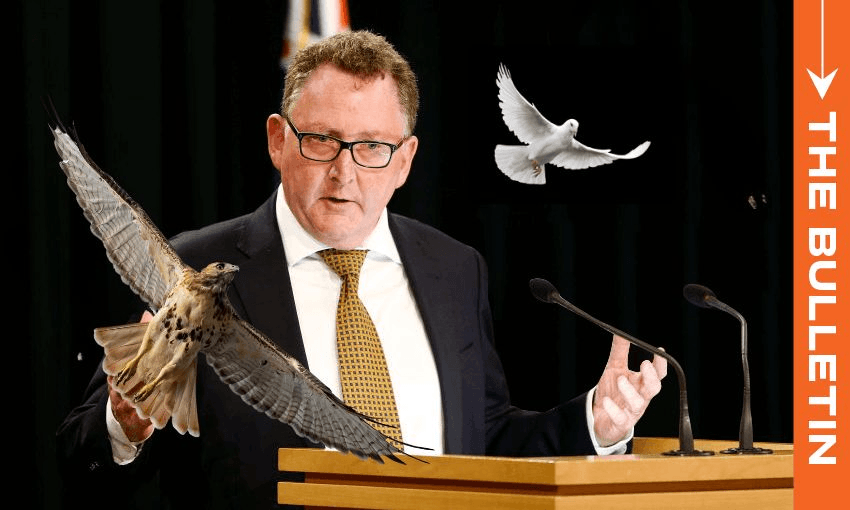Billed as one of the more consequential OCR decisions in a while, tomorrow’s call is set against a backdrop of rising mortgage costs and mortgage anxiety, writes Anna Rawhiti-Connell in this excerpt from The Bulletin, The Spinoff’s morning news round-up. To receive The Bulletin in full each weekday, sign up here.
Why all eyes are back on the Reserve Bank
It was only eight months ago that I ran a photoshopped picture of a hawk flying away and a dove coming in to perch on Reserve Bank (RBNZ) governor Adrian Orr’s arm. Apologies to all for the lazy and shoddy reverse today. Sometimes I wonder if Orr is looking forward to the day when people aren’t photoshopping birds into photos with him or, as interest.co.nz have done, turning him into a mythological creature called an OrrHawk. That link is worth a click (and not just to see an OrrHawk). David Hargreaves has penned a clear analysis of why all eyes are on tomorrow’s official cash rate (OCR) announcement and the case for and against an OCR rise. For the first time in a while, there’s uncertainty about the call against a backdrop of mixed economic data. Keeping in mind most of them lag, some indicators point to an economic slowdown and unrelenting cost pressures and anxiety. Others, like the latest domestic inflation figures, show a slower-than-preferred path for getting inflation back within the 1-3% range.
Huffed and puffed but will they blow the house down?
The RBNZ has held the rate steady at 5.5% since May last year. The assumed track between then and last November was that it start heading downwards, with various punts on when the OCR, and subsequently home loan interest rates, would fall. As Stuff’s Susan Edmunds explains in a good “how we got back here again” piece, the bank’s last update in November marked a shift in tone, leaving the door open to further rate rises in the event of nasty surprises (worsening economic data). That arrived in December with weaker-than-expected GDP data. That was followed by inflation data that highlighted domestic inflation was still proving sticky, and then unemployment data. Acknowledging that any rise in the unemployment rate means real people without work, the rate has lifted somewhat but is still considered low. ANZ economists threw a cat amongst already startled doves on February 9 with their prediction that the bank may yet push two more OCR hikes. ANZ remain lone wolves in that call, with Kiwibank economists picking up another wolf analogy yesterday in their latest update. Headlined, “But RBNZ, what great teeth you have”… “The better to threaten rate hikes with”. Kiwibank economists don’t think the RBNZ will hike, saying they’ve huffed and puffed and will probably continue doing so but won’t blow the house down.
Biggest single-year increase in size of average mortgage payments since 2008
StatsNZ figures released last week show that for the year ending June 2023, average mortgage payments increased 27.5%. Average weekly expenditure on mortgage payments was $605.60, compared with $475.00 in the previous year. In the latest RBNZ household expectations survey, the number of people saying they could miss a mortgage payment in the next three months increased from 12.4% to 17.3%. In November last year, it was estimated about two-thirds of mortgages fixed at low pandemic-era rates have now rolled over to pricier loans. As interest.co.nz’s Dan Brunskill reports, retail sales volumes have been falling for eight consecutive quarters and dropped another 1.9% in the last quarter of 2024. BNZ’s Doug Steel said the data showed New Zealand’s jets have not only been cooled but are now in reverse.
Rate rises and more cost increases
Politically, further rises to the OCR will be a real spoke in the wheel for a government that campaigned on bringing down the cost of living and getting us back on track. In an update for subscribers to The Kaka, yesterday, Bernard Hickey pulled no punches, saying the government’s “actions and inactions in its first 100 days have made domestic inflationary pressures worse, raising the risk the RBNZ is forced to hike on Wednesday to offset those pressures.” Hickey zeroes in on signalled price rises by domestic monopolies like Air NZ and power companies and the government pushing back infrastructure costs to local councils, which will likely prompt rate hikes.
